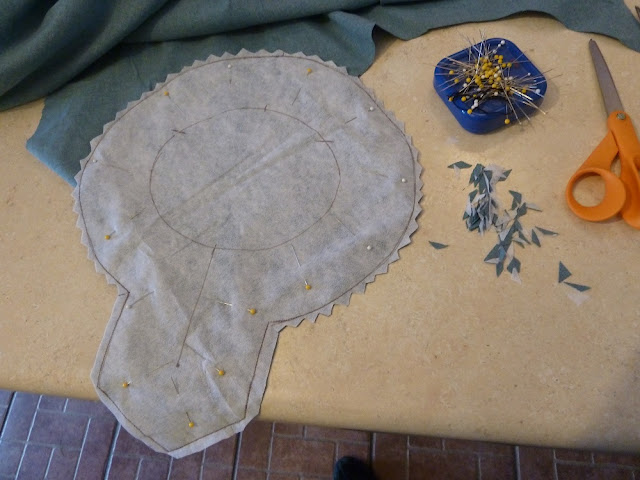First, take your keyhole neckline pattern (perhaps I'll make another post on how to draft this) and trace it onto the non adhesive side of some fusable interfacing. (this is the side without the bumps) I like to use crayola markers because they are cheap and come out when you wash the fabric.
make sure to mark the fold lines, they will help when you place the cut out keyhole on your fabric later. I also like to poke a hole in my pattern to mark where the slit in the keyhole ends, then use a ruler to connect it to the fold line.
Cut roughly around your interfacing. DO NOT cut out the center hole.
roughly cut your fabric to the same shape as your interfacing and pin it together.
Your non bumpy side of the interfacing should be on top. If your fabric has a wrong side, it should be facing you if you flip the fabric sandwich over. ( bumpy side and right side of fabric should be touching.)
The line you have traced onto your interfacing is the sewing line. Sew along this line on the exterior line only. (we'll work with that center circle later)

cut around, about 1 cm from where you've sewn.
snip where the round part meets the straight part, and trim the tips of the 3 pointed corners. This will help the fabric lay flat when you turn it.

clip "v" shapes all around the rounded part of the exterior of the keyhole shape. (this will also help the fabric lay flat later) Take care not to snip where you've sewn. (make sure you pitch all those little triangles before stupid cat eats them. No one wants to clean up pukie in the middle of a craft project.)
cut a slit ONLY in the interfacing.
remove your pins and turn the whole thing right side out. Finger press the seams flat. DO NOT use an iron. If you use an iron you'll fuse the thing to your ironing board. Once the keyhole shape has been turned right side out, trace over the lines from the front. The marker will have bled through slightly so it's easy to trace. This step isn't necessary, but I find it's easier to see when I'm sewing.
since I'm sewing this to a tabard, I've folded the fabric in half width-wise and lengthwise. Line the keyhole up with the fold marks on your tabard, and your pattern.

pin your keyhole to the fabric. The wrong side of the tabard should be facing up, along with the bumpy part of the interfacing on the keyhole.

sew along marked line around circular part. When you get to the straight line down the middle, sew about 1/8inch on and around line.
 cut about 1 cm from where you stitched in the round part and carefully down the center line. cut out notches as you did when you sewed around the outside of the circle.
cut about 1 cm from where you stitched in the round part and carefully down the center line. cut out notches as you did when you sewed around the outside of the circle.clip the corner where the round part meets the straight part. Clip a "V" shape where the straight line ends. These cuts will help the fabric lay better once turned.
Remove pins and turn so the bumpy part of the interfacing touches the right side of your tabard fabric. At this point you can use an iron to fuse the fabric together, following the manufacture instructions for your fusable interfacing. Or, if you have cats that are trying to burn your house down by knocking your iron over before it can heat up, finger press the seams, and pin.
It may take some finagling to get the bottom part of the keyhole slit to lay nicely. This is quite normal and can usually be made to behave with a bit of tugging of the garment fabric before it's pinned down.
stitch around inside and outside edges of keyhole shape close to the edge. If you're feeling fancy, you can zig zag the edges or use some sort of decorative stitch for embelishment. Viola! You've made a keyhole neckline!
If, for some reason, you don't want to have this keyhole as a contrasting color to the front of your garment, simply place the keyhole shape on the right side of the garment fabric instead of the wrong side. This will ensure that your keyhole shape is on the inside of your garment.
 Ideally this is reversible, however, sometimes the tip of the slit on the point, on the wrong side, get's wonky. This probably could have been remedied by fusing the fabric together. I was lazy and also didn't want the cats to burn down the house. My fabrics were not the same thickness either. This can also account for the wonky bunching. I'm satisfied that it looks good from the contrasting fabric side so I've not unpicked and fussed with it.
Ideally this is reversible, however, sometimes the tip of the slit on the point, on the wrong side, get's wonky. This probably could have been remedied by fusing the fabric together. I was lazy and also didn't want the cats to burn down the house. My fabrics were not the same thickness either. This can also account for the wonky bunching. I'm satisfied that it looks good from the contrasting fabric side so I've not unpicked and fussed with it.









